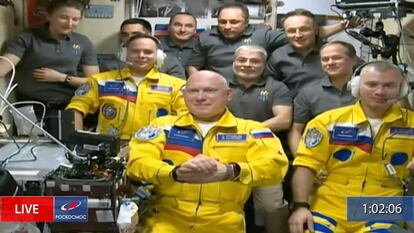Three Russian astronauts reach the International Space station with Ukraine’s colors
Oleg Artemyev, Denis Matveyev and Sergey Korsakov are the first Russian astronauts to arrive since the invasion of the neighboring country

Russia has two kinds of heroes: soldiers and astronauts. Their conquest of space and the Great War have been the two definitive events in recent history, and they have become a source of national pride for generations. That’s why the arrival of three Russian astronauts to the International Space Station with the colors of the Ukrainian flag, while the offensive on Kyiv takes place hundreds of kilometers from their home, has unleashed controversy throughout the country.
Oleg Artemyev, Denis Matveyev and Sergey Korsakov are the first Russian astronauts to arrive at the space station since the conflict began on February 24. They wore yellow suits with blue details and the Russian flag, and when they greeted Earth, they gave only a superficial explanation of their choice. “It was our turn to choose a color. We had a lot of yellow material anyway, so we had to use it,” Artemyev said, without clarifying whether they realized their uniforms could be associated with the Ukrainian flag.
The director of the Russian space agency, Dmitry Rogozin, congratulated the astronauts “for the long mission they’re beginning” in the Station alongside two Russians who had already arrived, Anton Shkaplerov and Piotr Dubrov. The head of Roscosmos had also recently published a video in which he read a monologue from the novel Taras Bulba, by Russian writer Nikolai Gogol, who was born in what today is Ukraine. Rogozin said he “heard from his parents and grandparents about how our land honored everyone,” as the broadcast showed in the background images of the country’s landscapes, including one that emulated the Ukrainian flag’s blue sky and yellow fields.
More than three weeks after the war began, Rogozin insisted that “there is no tie more sacred than comradeship.” “There were comrades in other countries, but there were no comrades like those in Russia,” the director said. A few weeks ago, he said, he saw in the Ukraine invasion “unique opportunities to restore the historic cooperation between Roscosmos and Ukrainian companies from the former Soviet space and military industry.”
The Russian press has avoided bringing up the issue of the astronauts’ colors. Most media outlets have mentioned only the successful arrival of the Soyuz MS-21 ship at the International Space Station “at 10.12pm, Moscow time.”
But the ultraconservative outlet Tsargrad took on the issue, arguing in a short editorial that the incident was a coincidence and criticizing The New York Times for “trying to find political subtext in everything that happens.”
The astronauts’ controversial appearance in blue and yellow occurred just few days after a journalist on Russia’s main television channel, Perviy Kanal, interrupted a live broadcast during prime time with a sign against the war in Ukraine.
It’s still unknown what will happen to Marina Ovsyannikova. The journalist had been sentenced to a fine of €250 for calling for protests in a recorded video. Her gesture on television could bring her a sentence of years in prison if she is tried under the new law against misinformation and discrediting the military, approved the week before the conflict began.
The war has also impacted international space cooperation. Scheduled takeoffs of spacecraft have been cancelled, and Moscow has threatened to suspend the supply of rockets to the United States. At the same time, the European Space Agency has suspended the ExoMars-2022 mission, meant to explore signs of previous life on the red planet in collaboration with Russia. The country would have contributed the Kazachok landing platform, while the community block would have provided the Rosalind Franklin vehicle. “Do we need some kind of rover there? It’s not necessary, because the landing module is already a scientific research station in itself,” the chief of Roscosmos insisted, though he recognized that the mission will be set back “a few years.”
Tu suscripción se está usando en otro dispositivo
¿Quieres añadir otro usuario a tu suscripción?
Si continúas leyendo en este dispositivo, no se podrá leer en el otro.
FlechaTu suscripción se está usando en otro dispositivo y solo puedes acceder a EL PAÍS desde un dispositivo a la vez.
Si quieres compartir tu cuenta, cambia tu suscripción a la modalidad Premium, así podrás añadir otro usuario. Cada uno accederá con su propia cuenta de email, lo que os permitirá personalizar vuestra experiencia en EL PAÍS.
¿Tienes una suscripción de empresa? Accede aquí para contratar más cuentas.
En el caso de no saber quién está usando tu cuenta, te recomendamos cambiar tu contraseña aquí.
Si decides continuar compartiendo tu cuenta, este mensaje se mostrará en tu dispositivo y en el de la otra persona que está usando tu cuenta de forma indefinida, afectando a tu experiencia de lectura. Puedes consultar aquí los términos y condiciones de la suscripción digital.








































